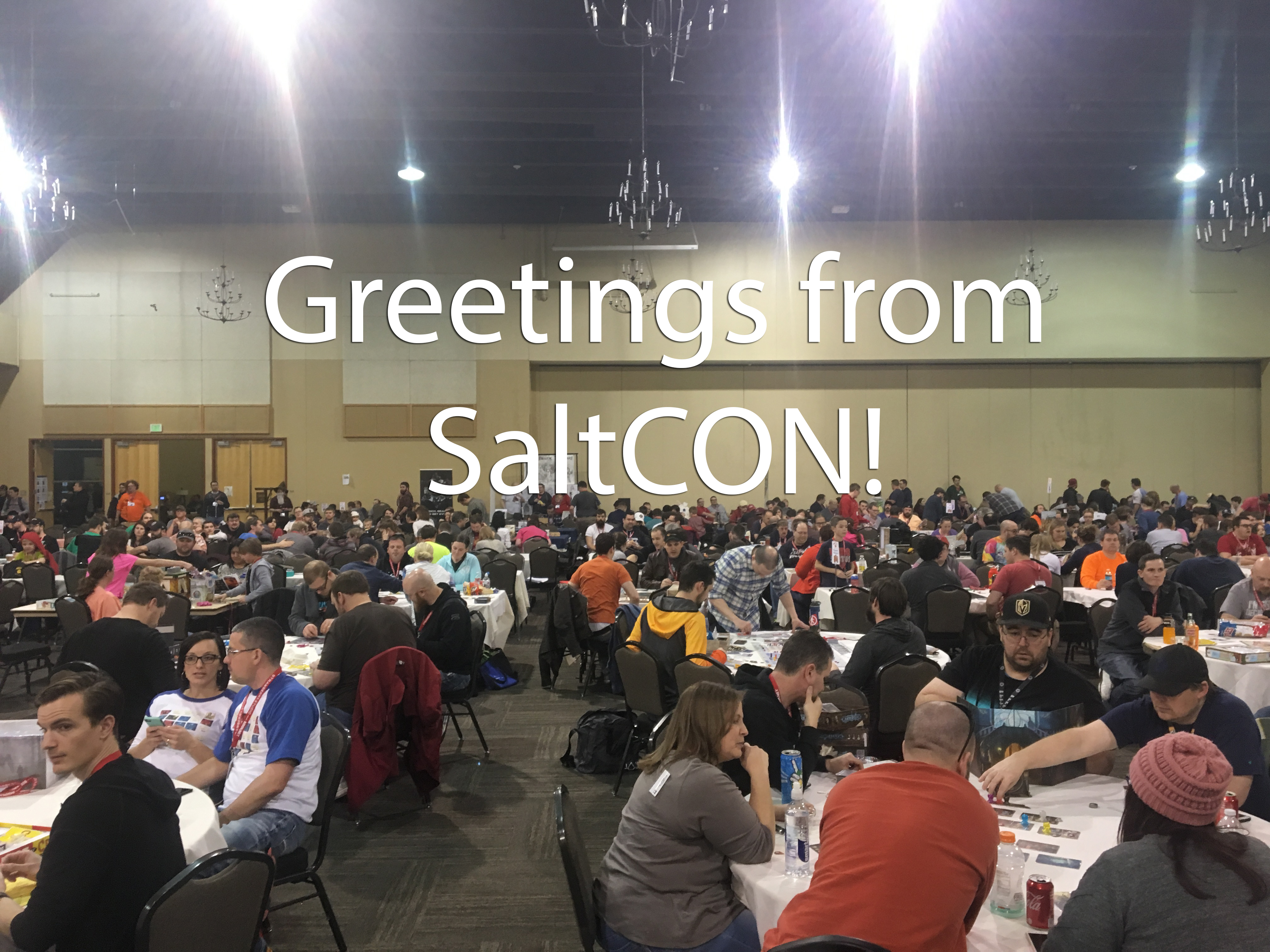
I may have mentioned my love for board games in previous posts (if not, shame on me). Game nights with friends and family are always some of my favorite times. What could be better than that?
How about an entire weekend dedicated to board games? (I think we have a winner.)
Earlier this month I made my way to SaltCON, a board game convention held in Layton, Utah. This was my fourth(?) time going, but my first attending more than just Saturday.
It. Was. Glorious.
I got to SaltCON at 9:00 Friday morning (March 2), just in time to check in, get my name badge and swag bag (which included a brand-new game!), and join the party. I wrote about my experience at the convention for Everything Board Games which dealt a lot about convention as a whole. Feel free to read it over at EverythingBoardGames.com.
Here, however, I want to discuss my top 5 games I played at SaltCON. This will include why I loved them so much, and even some takeaways from the games themselves. Ready to dive in? Let’s do this!
5. Space Cadets: Dice Duel
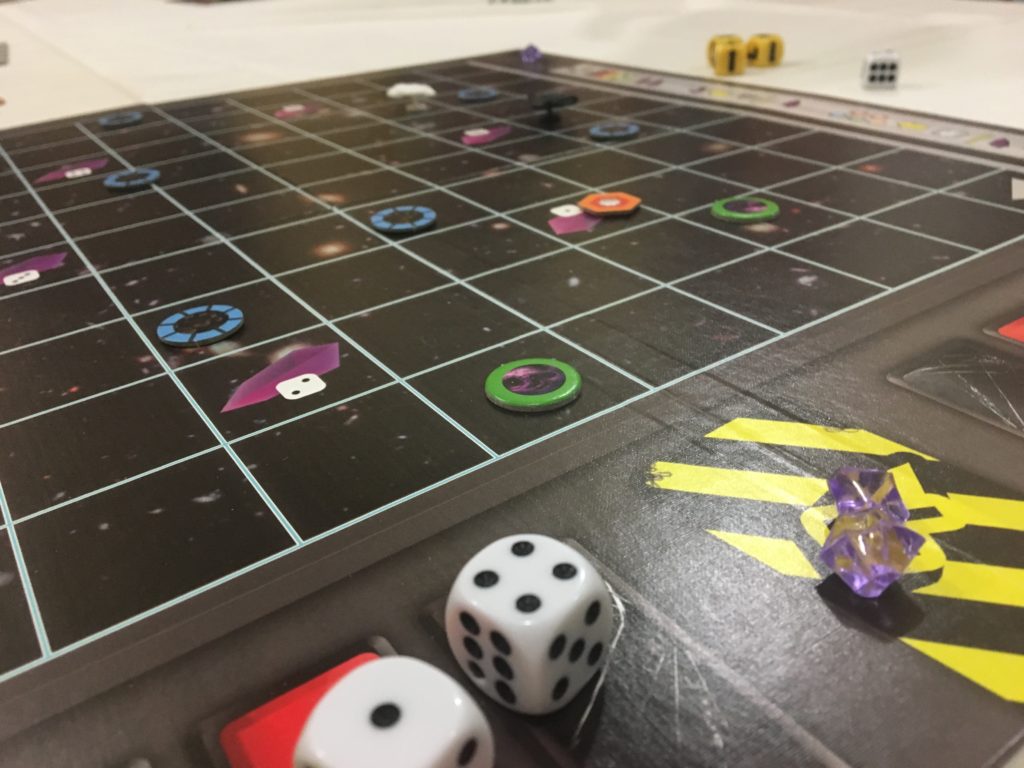
What it is
Space Cadets: Dice Duel is a real-time game of space combat in which there are two teams, and both teams control various parts of the ship at the same time. This means both ships move, load weapons, charge shields, and do all else necessary while the other team does the same with their ship. Each player on each team has a specific role – and specific dice – to roll. Players roll the dice until they get the result they want. Once their station is fully operational (or at least as operational as they can get it), certain actions may be carried out, such as ship movement, attacking, or engaging the tractor beam.
Why I loved it
From the get-go, this game was absolute and utter chaos. And it was wonderful. While I was frantically trying to load the weapons and power up the sensors and targeting computer, our other players were doing similar things in their stations. We tried to keep other aware as to our progress (“Weapons loaded in the front!”), but sometimes we just couldn’t communicate and it all broke dow.
For example, I thought I told our tractor beam and movement guys that we had range 4 on our enemy (i.e. we could fire at our enemy four spaces away from us). However, just before I was about to call “FIRE!” and blast the other ship out of the known galaxy, the tractor beam operator called out his action, and we were forced to pull in the enemy ship even closer, which then put us in range of them. We attacked each other, laughs were had, and then the chaos ensued.
Takeaways
Communication during space combat (or any combat) is crucial to faring well. If someone simply forgets to mention that the weapons are loaded in the rear and our ship is moving forward towards the enemy, well those weapons aren’t going to be very useful, are they? Likewise, keeping the team apprised as to what the enemy is doing (i.e. “They’ve got their weapons loaded to their rear! Charge rear shields before we die!”) can help the team counter enemy attacks more effectively.
4. Pulsar 2849
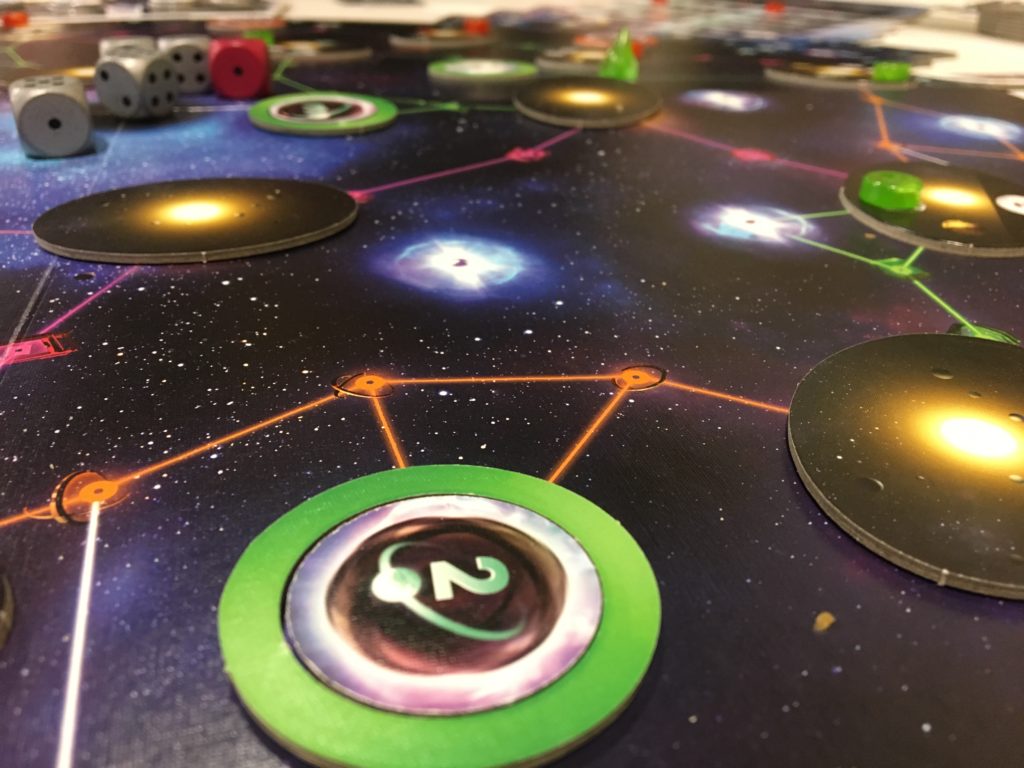
What it is
Pulsar 2849 is a space exploration game in which players race to get as many points as possible by the end of the game (8 rounds). Points come by building energy-producing gyron-things on pulsars, researching technology, creating outposts on planets, creating circuits, and more. It’s a dice drafting game as well, in which players take turns choosing dice rolled at the beginning of the round. Each dice corresponds to a specific action that can be taken, and there are ways of increasing or decreasing a roll to better suit your needs. While the took about an hour, it certainly felt shorter than that, due to my having way too much fun playing it.
Why I loved it
I love space games, so when I saw one that had a tech tree, exploration, and dice drafting with tons of ways to score, I knew I had to try it out. I think the main reason I liked this game is because there are just so many ways to score points, and one strategy is just as good as another. There’s also something to be said about working your tech tree to your advantage, as well as knowing when to fly through the galaxy and claim pulsars and explore systems, or when to focus on other (albeit less exciting) tasks. Even though I lost miserably, I had a good time doing it which, in my opinion, says a lot about a game.
Takeaways
Once you actually understand the game, don’t keep trying to finish it the way you thought you should when you started! It took me a few rounds to pick up on all the strategy, and I was actually in the lead. That lead lasted until the fifth round, and I got progressively farther behind from there. The problem? I didn’t adapt my strategy with my increased knowledge. Yes, I saw the vast importance of building the gyro-thingies in order to get points from them each round. I saw the ingenuity of playing towards certain end scoring conditions (which I did manage to salvage, but only by sacrificing other options in the process). What I didn’t do was take advantage of what I had before me.
I though, since I was already ahead, that I could remain that way. I should have known that slow and steady doesn’t always win the race. When your opponent starts catching up, it’s time to rethink your strategy. Sometimes, even though you’re ahead on the scoreboard, you’re already behind. Pay attention to how quickly people are building up points, or how they position themselves to blast ahead in a given round. Know your enemy!
3. Misborn: House War
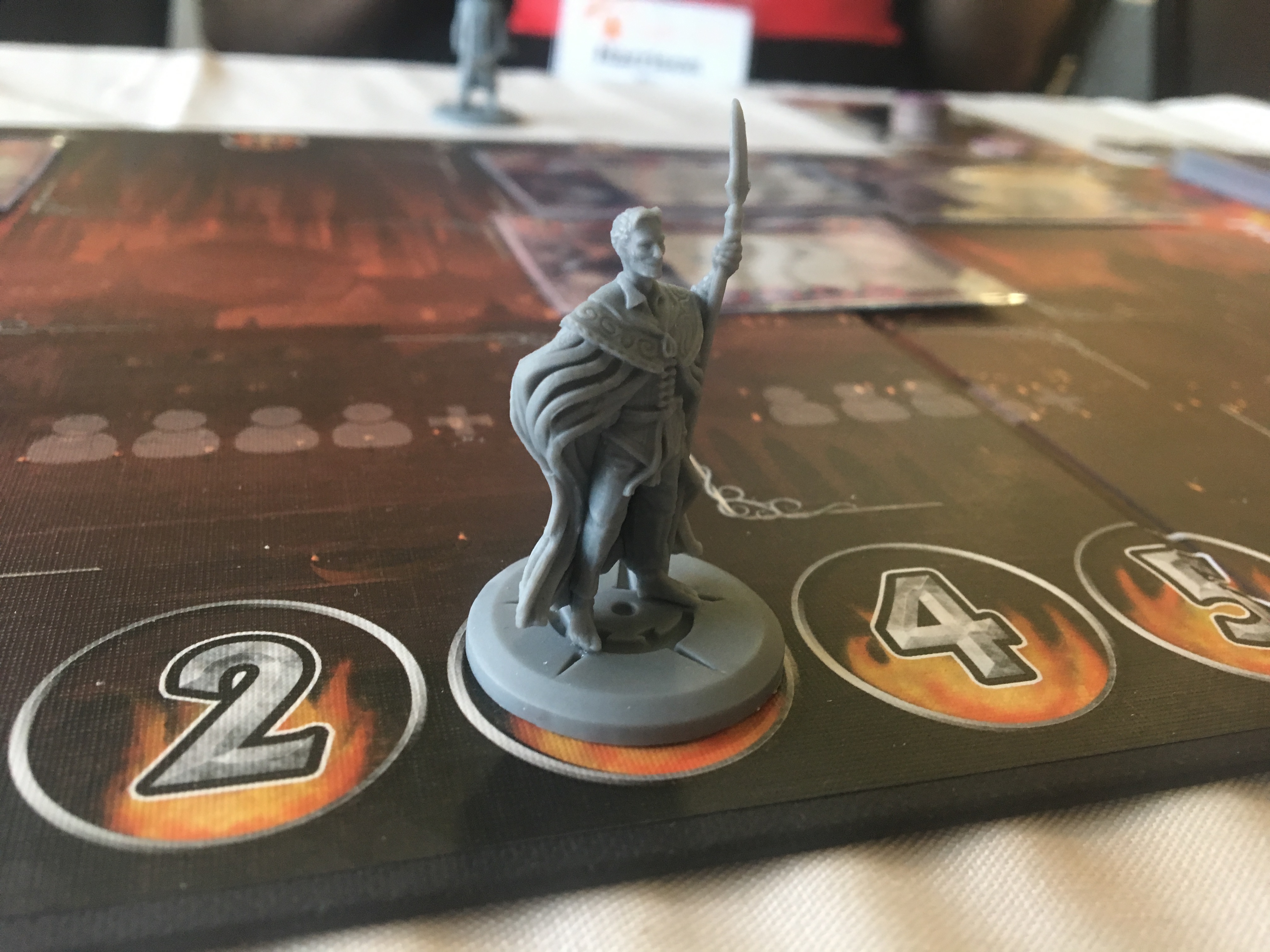
What it is
For those familiar with Brandon Sanderson’s book Mistborn, it won’t take long to understand this game. Essentially, each player controls one of the noble houses (each affording them certain resources at the start of their turn) and must either a) score the most points and defeat all the problems that arise before the Final Empire collapses, or b) score the least amount of points and help the skaa rebellion overthrow the Final Empire. Players must work together to pool resources in order to solve problems and gain points. Backstabbing, lying, and outright sabotage are all common themes the players employ in order to win the game.
Why I loved it
Confession: I actually own this game. Aside from Crokinole, this was the only game (out of a total of 23 plays) I played that I had already played previously, before SaltCON. I love it because 1) it’s Mistborn, and 2) the interaction between players is so much fun. Some problems will hurt some or all of the players if they are left unsolved (i.e. erupt). Others will push the game closer to the end, either for good or for ill. Depending on how the game goes, every player might be trying to gain the most points and therefor help the Final Empire from the rebellion. Other times it could be a mixture of players wanting to get the most points and players trying to get the least. In our game, two players tried to overthrow the Final Empire and three worked to keep it stable.
I was in the crowd of those trying to overthrow the Final Empire. At first, I was the only one getting points. It was great! But then, one other player decided to take matters into his own hands and start progressing the game to its end so fast that it soon became apparent that going for points might not be in my best interest. A few rounds in, I joined his “side” (not that there are teams or anything) and began working on the downfall of the empire. It came close to ending multiple times in favor of the Final Empire, but, through savvy play of cards (and some extreme luck of the draw), we managed to overthrow the Final Empire! I emerged victorious with the least amount of points (ironic), and one of those pushing for the Final Empire’s victory actually came in second place, which was quite shocking.
The deception and intrigue in this game is wonderful. It may start off slowly at first, but it escalates into something quite captivating, and this coming from someone who doesn’t particularly enjoy games like Munchkin where backstabbing is a way of life. Mistborn: House War does it so well that I get sucked into the world and take the role a bit too seriously.
Takeaways
The best takeaway I get from this is to jump on opportunities when they come and see them through to the end. I joined the rebellion bandwagon pretty early into the game, and by all accounts, from then on out it seemed as if I had made a grave mistake. But, I trusted my gut and forged ahead (I could have backed out a few times and still been in the running for most points). In the end, it was a tight battle of the houses, but ultimately good prevailed and the skaa rebellion succeeded. Fortunately, I saw my chance, took it, and forged ahead.
2. Scythe
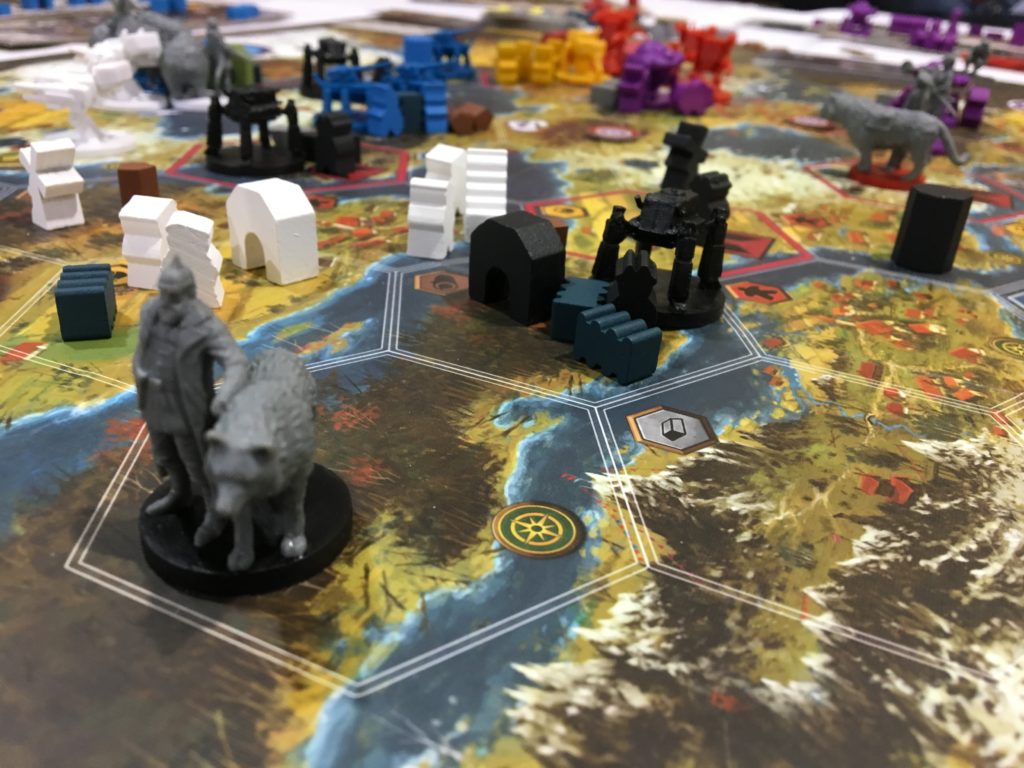
What it is
Scythe is a Euro-style area control, steam-punk game set in Europa right after WWI. Players choose one of a few actions on their player board, and then, if they have the resources necessary, may do another action associated with the first action they took. There is combat, resource management, and lots of decisions to keep this game fresh.
Why I loved it
While the theme was neat and all, it wasn’t the selling factor for me. What sold me on the game is how much there was to do! Like a lot of civilization or engine building games, Scythe started off at a slow pace (which was completely fine with me, especially since I was just learning). Things sped up quite a bit, however, as more workers, mechs, and actions became available.
Even though I botched a few turns here and there (and some more over there…), I never truly felt like I was out of the game. In fact, I ended up winning! The gameplay was deep, rich, and tickled my brain in a way I haven’t got from a lot of other games. There is so much to love about Scythe, but for my purposes here, I’ll leave it at this.
Takeaways
Sometimes losing a battle is the best thing that could have happened. What I mean by that is that when one door closes, another one opens. In Scythe, any time your workers, mechs, or characters are defeated, they return to your home region. This can be a good way of getting all the way across the very large board without using any movement actions. Being defeated also helps us open our eyes and reevaluate our strategy. Maybe I got too land hungry without enough focus on defending that land with war power? Or maybe I’ve been camping on that particular plot of land for so long that those workers/mechs could have been put to better use somewhere else. Losing a battle here and there is fine. Don’t stress it! But if you lose all your battles, then perhaps you should consider rethinking your strategy…
1. Captain Sonar
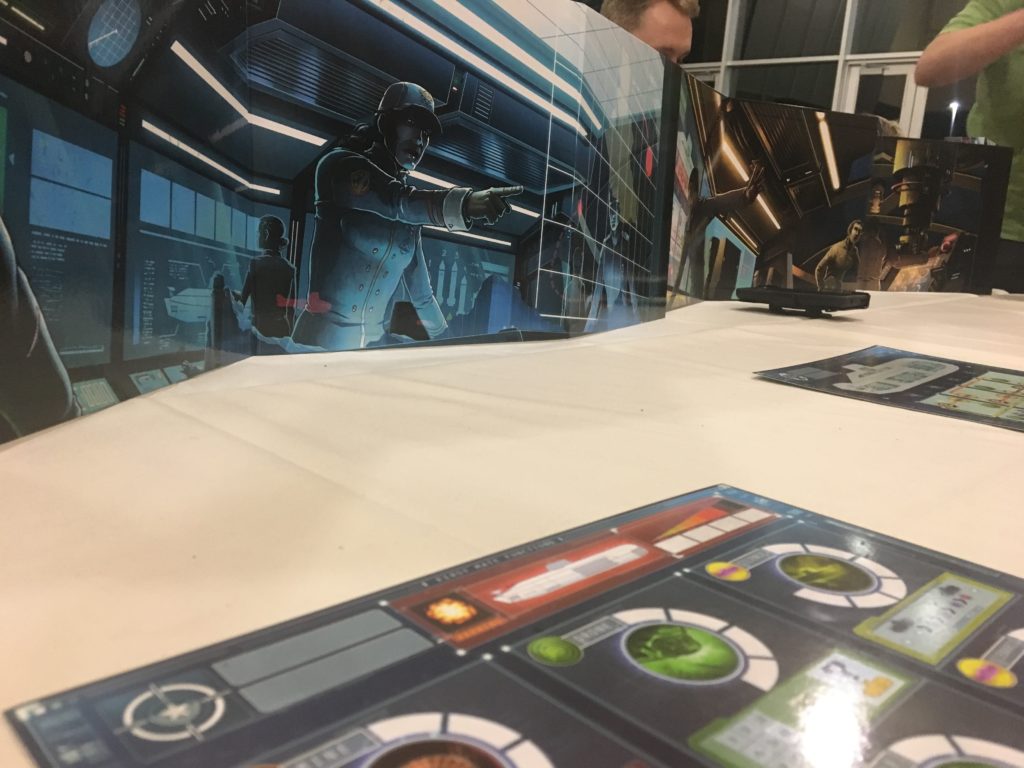
What is it
The crowning jewel at SaltCON, for me, was Captain Sonar. The second to last game I played there, this one had me feeling the most alive. Much like Space Cadets: Dice Duel, Captain Sonar pits two teams against each other, each team in control of a submarine. Again, both teams go at it simultaneously, moving, activating technology, and searching for the enemy. One player acts as the Captain, barking out orders and directions of travel. The Navigator listens to the opposing team’s captain, making note of the directions he gives (this is how the enemy ship is discovered, through trial and error). The First Mate activates various technologies and ensures the captain has the resources needed when called upon. The Engineer tells the captain how his decisions are making the submarine fall apart (it’s a rough life).
Starting at one randomly chosen dot on the map, the captain draws a line with his dry erase marker in the direction stated for all to hear. The navigator likewise starts on a random point on the map, drawing lines that correspond with the directions from the other captain. If the lines lead the navigator into an island, that’s obviously not where they are, so they reposition the overlay and try to find where they could be. Of course, sonar and drones help identify the enemy’s location as well, and eventually players will know where the other submarines are, fire torpedoes, and (hopefully) sink the other before the same happens to them.
Why I loved it
I played this game three times in total, each time as a different crew member. My favorite position was the captain, which I played as during my last game. Having directed live events in the past, this brought back all the stress, tension, and adrenaline of my former jobs. As the captain, I had to know absolutely everything that was going on, as well as listen to advice from my crew (even if my navigator did tell me to set off a mine…that our ship was sitting on…). With everything happening at once, and having to surface on occasion to fix the ship (thus giving away a lot more of our position), there was never a dull moment. Real-time games have always been a favorite of mine, but I think Captain Sonar beats all the others out of the proverbial water.
Takeaways
When trying to accomplish a task that seems near impossible at first (such as locating an enemy submarine with nothing but a few cardinal directions to go off), examine your resources. Use what you have to the best of your abilities. Even though I was new to the game, knowing what I had at my disposal helped me make decisions, and even answer questions, that came up during gameplay. Not sure where to start on a project? See what you have and go from there. And, if you’re lucky, your navigator won’t unintentionally blow you up.
Needless to say, SaltCON was a blast! I highly recommend attending it (or another board game convention near you) whenever you get the opportunity. Everyone is so incredibly nice, and I played with a bunch of random people I had never met before, which I think added to the fun even more.
What is one of your favorite games, and why do you love it? Let me know in the comments!